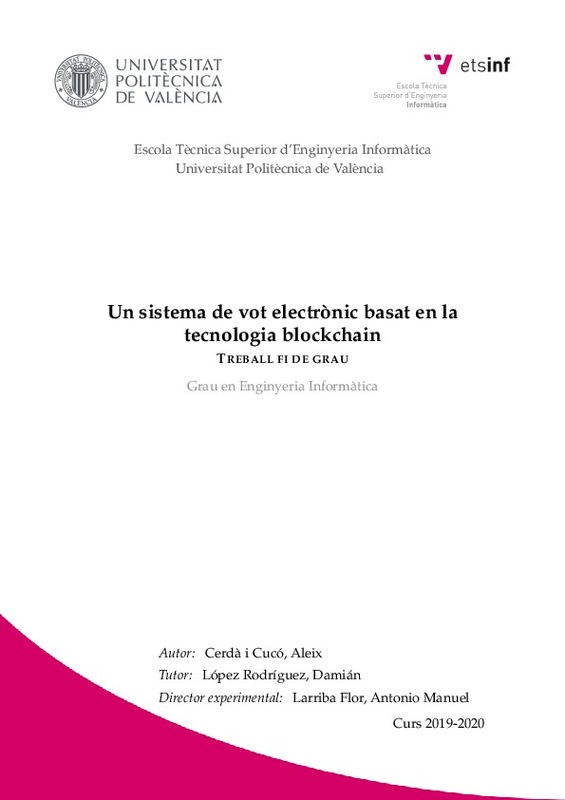JavaScript is disabled for your browser. Some features of this site may not work without it.
Buscar en RiuNet
Listar
Mi cuenta
Estadísticas
Ayuda RiuNet
Admin. UPV
Un sistema de vot electrònic basat en la tecnologia blockchain
Mostrar el registro sencillo del ítem
Ficheros en el ítem
| dc.contributor.advisor | López Rodríguez, Damián
|
es_ES |
| dc.contributor.advisor | Larriba Flor, Antonio Manuel
|
es_ES |
| dc.contributor.author | Cerdà Cucó, Aleix
|
es_ES |
| dc.date.accessioned | 2020-09-18T14:49:32Z | |
| dc.date.available | 2020-09-18T14:49:32Z | |
| dc.date.created | 2020-07-14 | |
| dc.date.issued | 2020-09-18 | es_ES |
| dc.identifier.uri | http://hdl.handle.net/10251/150385 | |
| dc.description.abstract | [CA] En els últims anys estem veient com l’estat democràtic, el més comú dels sistemes d’organització actuals, està canviant. Decisions que necessiten de la col·laboració entre diverses forces polítiques i el consens de gran part de la ciutadania pareix que indiquen que el nou paradigma ens portarà a alternatives on és requerirà la participació activa de la població en el procés democràtic. Aquest canvi però, no serà possible si no actualitzem el mecanisme principal per a prendre decisions en grup de forma directa, la votació. Les últimes eleccions generals costaren prop de 140 milions d’euros, és necessita un sistema que faja de votar una tasca barata, còmoda (tant per a organitzadors com per a l’electorat) i accessible, sense oblidar la seguretat i els valors democràtics. És per això, que presentem un sistema de votació electrònica enfocat en la confiança i la seguretat, que pretén convèncer tant aquelles persones amb grans coneixements criptogràfics i matemàtics com a aquelles que son noves en aquest camp, gràcies a la utilització de tècniques criptogràfiques i la involucració dels propis partits com a actors principals que posaran en joc la seua reputació en un sistema que els farà col·laborar, però que al mateix temps, els seus interessos antagònics els forçaran a comportar-se de forma honesta. | es_ES |
| dc.description.abstract | [ES] Durante estos últimos años hemos visto como el estado democrático, el más común de los sistemas de organización actual, está cambiando. Decisiones que necesitan la colaboración entre diversas fuerzas políticas y el consenso de gran parte de la ciudadania parece que indican que el cambio de paradigma nos llevará a alternativas en las que se requerirá la participación activa de toda la población en el proceso democrático. Este cambio no será posible si no actualizamos el mecanismo principal para tomar decisiones en grupo de forma directa, la votación. Las ultimas elecciones generales costaron cerca de 140 millones de euros, se necesita un sistema que haga de votar un proceso barato, cómodo (tanto para la organización como para el electorado) y accesible, sin olvidar la seguridad y los valores democráticos. Es por eso, que presentamos un sistema de votación electrónica enfocado en la confianza y en la seguridad, que pretende convencer tanto a las personas con grandes conocimientos criptográficos y matemáticos como a aquellas que son nuevas en el campo, gracias al uso de técnicas criptográficas i a la involucración de los propios partidos como actores pricipales que pondrán en juego su reputación en un sistema que les hará colaborar, pero que al mismo tiempo, sus intereses antagónicos les forzaran a comportarse de forma honesta. | es_ES |
| dc.description.abstract | [EN] In recent years we have seen how the democratic state - the most common of today’s organizational systems - is changing. Decisions that need the colaboration of multiple political forces and the consensus of a great part of the citizenry seem to indicate that the new paradigm will lead us to alternatives where the active participation of the population in the democratic process will be required. However, this change will not be possible if we do not upgrade the main mechanism for making group decisions, voting. The last general election costed us about 140 million euros. A new system is needed, one that makes voting a cheap, comfortable (both for organizers and for the electorate) and accessible, without forgetting security and the democratic values. For this reason, we present an electronic voting system focused on trust and security which aims to convince both those with great cryptographic and mathematical knowledge and those who are new in this field, thanks to the use of cryptographic techniques and the involvement of the parties themselves as major actors that will jeopardize their reputation in a system that will make them collaborate and at the same time, their antagonistic interests will force them to behave honestly | es_ES |
| dc.format.extent | 42 | es_ES |
| dc.language | Catalán | es_ES |
| dc.publisher | Universitat Politècnica de València | es_ES |
| dc.rights | Reconocimiento - No comercial - Compartir igual (by-nc-sa) | es_ES |
| dc.subject | E-voting | es_ES |
| dc.subject | Blockchain | es_ES |
| dc.subject | Vot electrònic | es_ES |
| dc.subject | Criptografia | es_ES |
| dc.subject | Voto electrónico | es_ES |
| dc.subject | Criptografía | es_ES |
| dc.subject | Electronic vote | es_ES |
| dc.subject | Cryptography | es_ES |
| dc.subject.classification | LENGUAJES Y SISTEMAS INFORMATICOS | es_ES |
| dc.subject.other | Grado en Ingeniería Informática-Grau en Enginyeria Informàtica | es_ES |
| dc.title | Un sistema de vot electrònic basat en la tecnologia blockchain | es_ES |
| dc.type | Proyecto/Trabajo fin de carrera/grado | es_ES |
| dc.rights.accessRights | Abierto | es_ES |
| dc.contributor.affiliation | Universitat Politècnica de València. Departamento de Sistemas Informáticos y Computación - Departament de Sistemes Informàtics i Computació | es_ES |
| dc.contributor.affiliation | Universitat Politècnica de València. Escola Tècnica Superior d'Enginyeria Informàtica | es_ES |
| dc.description.bibliographicCitation | Cerdà Cucó, A. (2020). Un sistema de vot electrònic basat en la tecnologia blockchain. http://hdl.handle.net/10251/150385 | es_ES |
| dc.description.accrualMethod | TFGM | es_ES |
| dc.relation.pasarela | TFGM\125054 | es_ES |
Este ítem aparece en la(s) siguiente(s) colección(ones)
-
ETSINF - Trabajos académicos [5160]
Escola Tècnica Superior d'Enginyeria Informàtica






